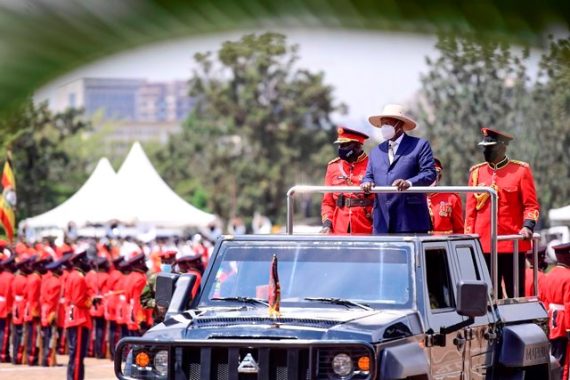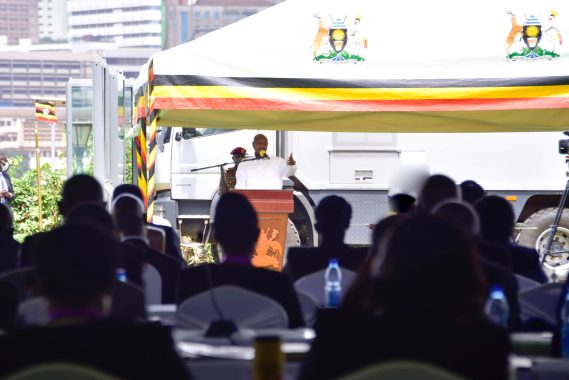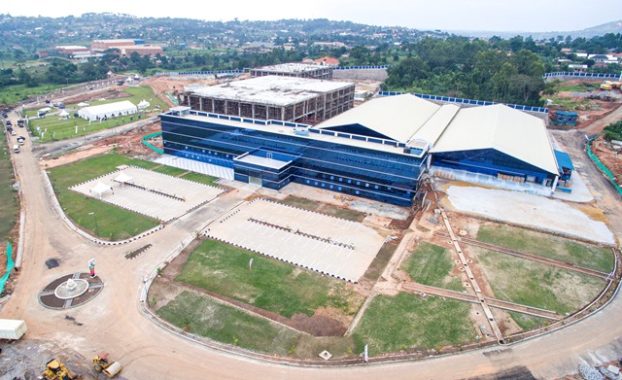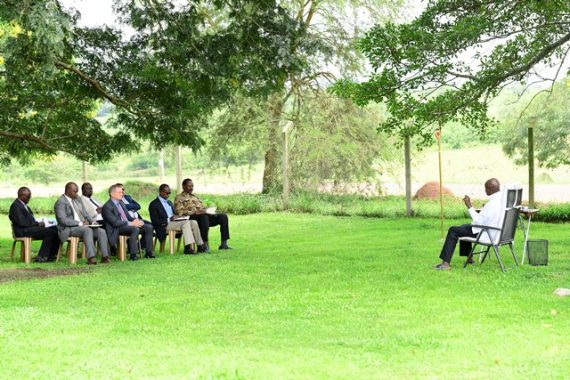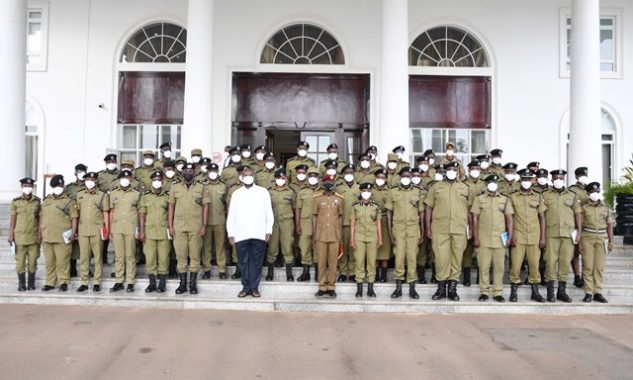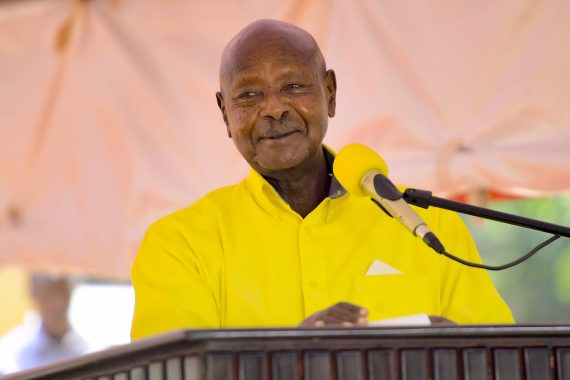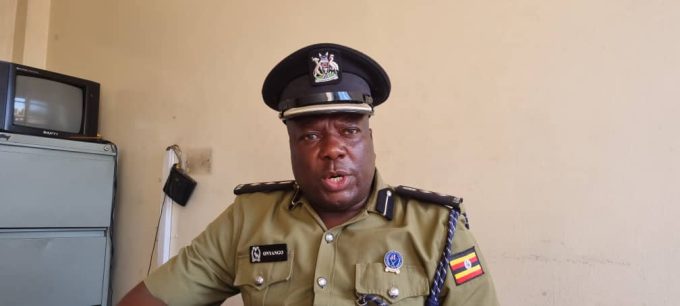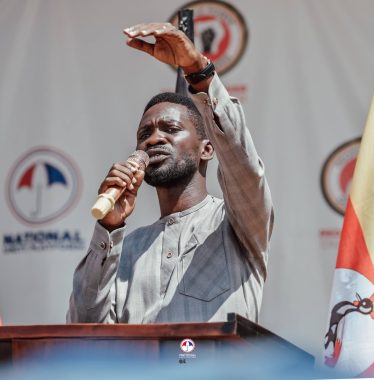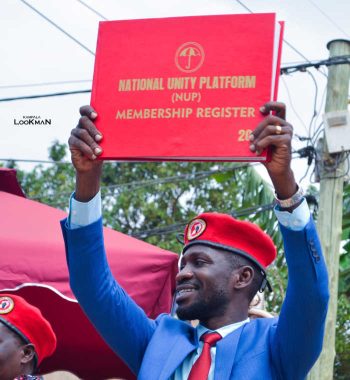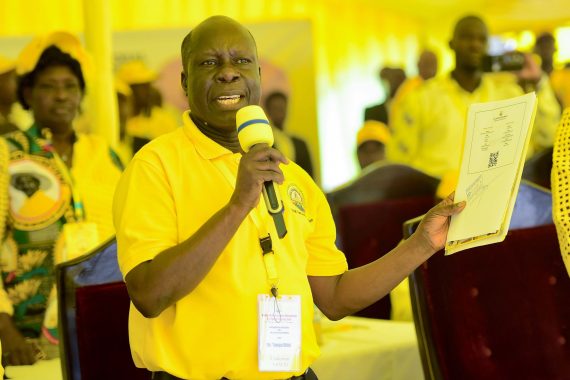Independence Celebrations
President Museveni has sounded passionate about a united East Africa and Africa in his speech on Uganda’s 60th Independence Celebrations at Kololo Airstrip in Kampala.
President Museveni made calls on value addition and the case against imports from Asia and the West. Below is Museveni’s speech;
SPEECH
BY
H.E. YOWERI KAGUTA MUSEVENI
PRESIDENT OF THE REPUBLIC OF UGANDA
ON
INDEPENDENCE DAY
UNDER THE THEME:
“A DECLARATION OF AFRICAN INTER-DEPENDENCE AND OUR SHARED DESTINY”
KOLOLO 9TH OCTOBER, 2022
Excellencies, Heads of State and heads of delegations
from the brotherly countries of the EAC and from
friendly countries,
Their Excellencies the First Ladies,
H.E. Vice President of Uganda,
Rt. Hon. Speaker,
His Lordship the Chief Justice,
Rt. Hon Prime Minister,
Hon. Ministers,
Hon. Members of Parliament,
the Rt. Hon. Secretary General of the NRM,
Members of the Diplomatic Corps,
Ladies and Gentlemen.
First of all, I thank their Excellencies the Heads of State for agreeing to come and share with us this joyous
occasion in spite of their busy schedules. I also thank the brother countries that sent delegations. Secondly, I congratulate all Ugandans on this occasion of the 60th Anniversary of Uganda’s Independence. It has been quite an eventful 60 years. Naye Abaganda tugamba nti: “Ekitatta Muhima tekimumarako nte” – “if a Muhima (a Munyankore) doe not die, even if the cattle die, he will always get new cattle”. In spite of the numerous problems over these 60 years, Uganda is now standing and arching forward. It is not only Uganda that faced problems; so did many African countries. That is why, on this occasion, I would like to ask the African political class the following two questions. Two historical questions are: “Are there Professors of Economics in Africa? Is the African Political Class determined to build a Latin America in Africa Instead of the United States of Africa in Africa?”
Even by the time we defeated Idi Amin in 1979, our thinking on the philosophical, ideological and strategic issues, was well crystalized. Philosophy, tries to understand man and his motivations. Ideology deals with ideas about the management of Society and strategy deals with the methods, used to implement whatever plans you have for society.
On the side of philosophy, we had discovered that while there may be some ultruistic actors in Society, the majority of people were ego-centric. Hence, the wisdom of using the private sector in the economy, without banishing completely the use of parastatals.
On the side of ideology, we discovered that in order to create prosperity for our people through the production and sell of goods and services, we need to emphasize the four principles of: patriotism (loving Uganda), pan-Africanism (loving va Africa), socio-economic transformation and democracy. In order to use our understanding of philosophy and our ideology to create global pharmaceutical business is US$ 1.42 trillion; Africa’s share is US$16 billion. The global business for furniture is US$654.20 billion; Africa’s share is US$4.86 billion. The global business for textiles is US$ 1 trillion; Africa’s share is US$ 31 billion. The global business for cereals is US$1,337 billion; Africa’s share is US$275.80 billion. The global business for milk is US$308.8 billion; Africa’s share is US$18.06 billion.
The global business for fruits is US$622.80 billion; Africa’s share is US$56.30 billion. The global business
for electronics is US$1,062 billion; Africa’s share is US$82.16 billion. The global business for electrical
equipment is US$1,540.25 billion; Africa’s share is US$120 billion. The global business for beef is
US$414.98 billion; Africa’s share is US$333.90 million.
The global business for fish is US$544.20 billion; Africa’s share is US$46.87 billion.
It is this, that prompts me to ask the Question: “Are there professors of economics in Africa?” Of course, it
should be the political leaders that should evolve policies about these issues. The question, however, is:
“If the political actors do not see this haemorrhage, why should the academicians not see it? Are they not
supposed to scan the global system as to what is going on where and why?” Are professors and academicians, not supposed to use their knowledge to see what is good or bad for their people? It is a tragedy.
Here, in Uganda, we have had to fight the neo-colonial politicians, civil servants, parasitic importing
merchants, on account of this haemorrhage. Through struggle, we have caused vertical integration in some sectors outlined here below:
(1) Maize – to produce maize flour (akahuunga); animal feeds; and we are targeting starch and
ethanol.
(2) Milk – processed liquid milk, ghee, butter, powdered milk, casein proteins, cheese, yoghurt.
(3) Cotton – textiles, vegetable oil, animal feeds, gun-powder being planned.
African market is flooded by dead people’s clothes (emichwijuro) from the USA and Europe known
as second hand clothes – thereby exporting money and jobs.
(4) Sugar cane (ebikoijo) – raw sugar, industrial sugar, ethanol, rum, animal feeds, electricity.
(5) Cattle – beef, leather (recently).
(6) Fish – Fish fillet (there are 14 factories operating now); Nile Perch maw is being developed as a big export earner.
(7) Bananas – banana flour; banana starch; banana juice (Eshaande – Omubisi); banana wine; banana
gin (waragi); alcohol sanitizers (anti-corona); big war with the political class and the bureaucrats over this
banana project; bananas good for potassium and carbohydrates; apart from vitamin C in ripe
bananas (amenvu).
(8) Fruits – fresh fruit exports; fruit juice (Teju); fruit pulp; later jam.
(9) Sorghum – beer brewing.
(10) Pines – ceiling boards; furniture; until recently, furniture for Uganda, including Government departments was being imported from China, India, Dubai etc.; imagine that!!
(11) Gold – Gold refinery – (for electronics, jewellery, etc.)
(12) Limestone- Cement; cement blocks; pavers.
(13) Scrap metal steel bars (emitayimbwa); steel gate doors.
(14) Used car batteries, Recycled batteries
(15) Rubber – car and motor cycle tyres.
(16) PVC – plastics; textiles; blankets.
(17) Palm oil – soap; cooking oil.
(18) Sesame seeds (sim sim)
Cooking oil; soap manufacture.
(19) Marble – marble tiles; sanitary ware.
(20) Clay – Industrial ceramics.
(21) Granite – pavers; building blocks.
(22) Tea – tea leaves processing (there are 31
factories).
These achievements, have been in spite of the stiff opposition we have been facing from the parasites and
their foreign backers, such as the Monitor Newspaper.
To take an example, this paper, on the 22nd of May, 2022, it said that: “Coffee deal stinks; but key culprit
will not be punished”. In other words, Museveni is committing a crime by trying to add value to the
Ugandan Coffee.
Since 1986, I have been trying to get investors to add value to our coffee. On the 12th of November, 1997, I wrote a letter to Hon. Mayanja Nkangi to complain about lack of movement on the issue. Our farmers, are paid an equivalent of US$ 70 cents per kg of low-grade coffee. The same kilogram, when roasted, ground into powder and packaged, it sells for US$12.9 in a Super market. This is the slavery I cannot accept. How can it be that the Economics Professors of Africa, do not see this? How can it be that the Ministries of Finance of Africa, do not see this?
After that, I engaged the Nestle group in Davos. They made it clear that they already had their factory for
coffee processing in the UK and would not build a new one. Hence, we had to remain as Raw-Material
producers, getting only 5% of the value of the coffee we grow. They, moreover, try to muddy the water by
claiming that “blending” of the different coffees can only take place in Europe etc. We told them that Uganda had all the varieties and the blending would be done here. That has been the war, I have been involved in until I got the Vinci Company to help me. You heard how some of the MPs were talking in that war.
Mwalimu Julius Nyerere, had built a coffee processing factory in Bukoba, in Tanzania, near the border of
Uganda. When I heard of that, I linked our people with that effort. They were producing an end product known as “Star Coffee”. Unknown to me, the officials of Uganda, allowed that effort to die out or get stunted.
What blindness and betrayal this is!! To add to the story of coffee, there is the story of iron
ore. Uganda has got the purest iron ore (obutare) in the world – 70% pure. The nearest is the one of Peru which is 58% pure. An Indian company, working with some locals, had planned to export this high-grade raw material to India and to be paid US$47 per tonne. Out of 1000kgs of this butare, when you process you get 700 kgs of steel. A tonne of steel, at that time, was selling at US$550. Today, a tonne of steel is US$ 700.
I stopped that theft. If I had not stopped that theft, it would have meant that Uganda would be donating
money and jobs to the outsiders and would be losing its natural resources and would remain perpetually
underdeveloped. I cannot be a part of this. We have now, finally, got investors that are ready to build a
vertically integrated steel industry, that will produce high strength products that we need for hydro-power dams, for high-rise buildings, for the standard gauge railway and for our auto-mobile and military
industries. Each year, Uganda spends US$362million on the imported steel and steel products. East Africa,
spends US$2.5billion on steel products if you include automobiles which consume alot of steel. Yes, we have 12 factories recycling scrap metal. This recycled steel helps us to get mitayimbwa (steel bars) for low-strength buildings. The products of recycled steel cannot, however, be used for high-strength structures like dams, the standard gauge railway etc. Hence, the endless haemorrhage. Why should this be tolerated?
Why should this be happening in Africa 65 years after Ghana’s independence? This crime of donating Africa’s resources at a pittance to clever outsiders, applies to copper, cobalt, tin, coltan, etc. Any wonder that African youth do not have jobs and must go for semi-slave jobs abroad? Those jobs are donated by African planners to the outsiders. This is the war I have been fighting here in Uganda for the last 60 years. I thank those elements in NRM that seriously support this position.
I appeal to all the others to support these liberation efforts. It is a matter of survival and crucial for our
prosperity.
The second question I want to pose, again, is: “Is the political class in Africa determined to build a Latin
America in Africa or a United States of Africa in Africa?”
This question should have been answered at Independence. Mwalimu Nyerere, Nkrumah, Modibo
Keita, Sekou Toure and, may be, Lumumba (he was killed too early), raised this question and tried to
answer it in a correct way. Their voices were, however, smothered by the collaborators and, instead, the
nebulous OAU was created. In the last 500 years, two good laboratories have emerged on the global stage:
Latin America and the North America continent. European populations expanded into the two
continents of the Americas that were inhabited by Indians of the West. The European populations, came
from Spain and Portugal to take over Latin America and from the UK to take over North America. After 500 years, there is great prosperity in North America and misery and poverty, in Latin America. Yet, in terms of natural resources (water, forests, agricultural land, minerals, etc.), Latin America, may be richer than North America. What, then, accounts for the difference? The difference, partly, emerged from the
political-economic-organization of the two continents.
Latin America is excessively fragmented, politically and economically, comprised of 12 countries and, if you include the Caribbean, the total number of countries rises to 25. The North American continent, on the other hand, is comprised of only 3 countries: Mexico, the USA and Canada. The USA is a 3 million sq. miles unit, with a population of 332.4 million people. It is that big market, that stimulated the growth of the USA economy. It is not easy to be a successful business person in Honduras (population 10,432,860), El-Salvador (population 6,336,392), Panama (population 4,408,581), etc., etc., on account of the small
populations. In Latin America, they never even attempted to form a common market, like the one of
Europe. A common market, however, would not be free of problems of discordance. You have seen Britain
walking out of that body and you have seen the tensions with Hungary, Serbia, etc.
Hence, the best formula, if possible, so as to create a framework for guaranteeing the prosperity of People, is the USA formula – which entails both political and economic integration. Here, in Africa, it points to the creation of political federations, like the one of East Africa. Such a Federation, would guarantee, not only the prosperity of the People through a big market that would guarantee off-take for the producers of goods and services, but it would also ensure strategic security of People. Nobody would dare to threaten their security. They would ensure their four dimensional strategic security – on land, in the air, at sea and in space. It would also deal with the problem of the suppressed fraternity of the African Peoples. The 54 countries of Africa created by colonialism, do not pay the slightest attention to the four linguistic groups of Africa. The four are: the Niger-Congo; the Nilo-Saharan; the Afro-Asiatic; and the Khoisan. These are the four clusters (obushaba) of nations (amahaanga) based on languages. Obviously, the 54 countries do not pay attention to this. Hence, here in East Africa, you find the interlacustrine Bantus of this area, are scattered in Uganda, Congo, Rwanda, Burundi, Tanzania and Kenya. Yet, these are Peoples, whose dialects are mutually intelligible. Some months ago, at Munyonyo, I found a group of young people seated.
When I engaged them, I found they were Kenyans (in itself a task to discover who is a Ugandan or a Kenyan).
I, then, asked one of them, a girl, what her name was. Her answer: “Kwambuka”. “Kwambuka!! “Where do you come from?”, was my next question. Her answer:
“Kisii”. “What does Kwambuka mean in Kisii?”, I asked the young lady. The answer: “It means crossing a river or valley”, the young lady answered!! That is exactly what it meant in the Runyakitara dialects.
It is not only the Interlacustrine Bantu that are fragmented in these countries. How about our Luos (in
South Sudan, Congo, Uganda, Kenya, Ethiopia and Tanzania). The Kalenjin (Uganda, South Sudan and
Kenya) and the Ateker (South Sudan, Congo, Uganda, Kenya, Ethiopia and Tanzania)? When you talk of the Luo (the Nilotics), you are talking of the Alurs, Acholis, Langis, Japadhola, Luos, Anywak in Ethiopia, Kumam, etc. When you talk of the Kalenjin, you are talking of the Sabiny, Pokot, Nandis, Kipsigis, etc. When you talk of the Ateker, you are talking of the Kakwas, the Bari, the Topotha, the Turkana, the Karimajong, the Itesot, etc. Where do the Masai belong? Are they Ateker or Kalenjin? Help the author, please. However, I know that they are, certainly, Nilo-Hamitic. In the case of East Africa, we have the added bonus in the form of fraternity of the Swahili language speakers.
It has, therefore, been long, ever since the NRM and its pre-cursors, started supporting the struggle for the realization of the dream of the East African Federation.
If we had achieved that by 1963 as the elders had intended, this part of the World would be very far.
Some of the political elite, let down Africa in 1963 by frustrating the effort. If the Federation had been
launched in 1963, you can be sure that Idi Amin would never have taken power in Uganda, there would have been no genocide in Rwanda or the killings in Burundi, Congo would have stabilized long ago, the problems of South Sudan, would have been solved much earlier and the problem of Somalia may not have turned out the way it did. Even today, the sort of problems we are facing, would be easily solved. Take the problem of high food prices. A few years ago, Uganda produced 5million tonnes of maize. Uganda consumed only one million tonnes because Ugandans have other foods. It is only institutions and the animal feed manufacturers, that use maize. There was, therefore, a surplus of 4 million tonnes which had no market in East Africa on account of the non-tariff barriers (protectionism). The
prices collapsed and the farmers in Uganda, walked away from growing maize. Only now to be told that
there is a big demand for maize and even people are dying. The story of maize, is the same as the story of
milk, sugar, etc.
In my opinion, East Africans will be better off, if the most efficient East African producers, are encouraged
so that the whole of the region benefits. Recently, I was told of some attempts by some Ugandans to block rice from Tanzania in order to “protect” the inefficient rice growers of Uganda!! I could not accept such blindness.
Why, first of all, punish Ugandans to consume expensive rice while our Tanzanian brothers can produce cheaper rice? The other blindness is that you should remember that if you block Tanzanian rice,
Tanzania will also block something else from Uganda.
Where, then, is the future of prosperity for our region? Why block East African products and open our markets for subsidized goods from Europe, China, Brazil, etc.?
Those should be the ones to be blocked because they are unfairly selling in our market. Foreign
Governments subsidized goods versus our unsubsidized goods. If you allow subsidized Brazilian
products to kill the market for Uganda’s sugar in East Africa, what return benefits will East Africa get from
Brazil?
East Africa is a potential super-power of the League of India or China etc., if we integrate economically and politically, assisted, fortunately, by the Swahili language, which is part of the heritage of this area.
If our Economics Professors wake up and see the haemorrhage the NRM revolutionaries have been
seeing ever since the 1960s on account of only producing raw-materials and the political class
determines not to build a Latin America in Africa but instead build a United States of Africa in Africa, a very prosperous and secure future for Africa will be ensured.
In spite of the missed opportunities in the East African Region and in spite of so many avoidable mistakes that were committed by different actors, Uganda, finally, stabilized and started, not only growing, but also, undergoing social-economic transformation, ever since The small independence enclave colonial
economy of 1962 of the 3Cs and 3Ts, had by 1986, shrank by 25%. The 3Cs were: Coffee, Cotton and
Copper; and the 3Ts were: tobacco, tea and tourism.
By 1986, all the 3Cs had disappeared, except coffee that was still limping on. All the 3Ts had disappeared,
except tobacco which was still limping on.
Having lost 24 years of the 60 years, the NRM, our Movement, had fortunately, had many years of
clarifying our philosophical, ideological and strategy positions on almost all issues of society and economy.
We had already distilled our four principles of patriotism, Pan-Africanism, Social-economic
transformation and democracy. To realize the four principles, we put forward the 10 points programme,
out of which point no. 5 was the one guiding us to build an integrated, Independent and self-sustaining
national economy, that rejected the slave role of confining ourselves to producing raw-materials.
The principle of patriotism struck a bloc at the politics of identity (sectarianism of religion and tribes) and pushed forward the politics of the legitimate interests of all sections of our People. That is why, ever since
1989, the NRM always won all elections by absolute majority in both popular votes and the electoral
colleges. In the 1962 Independence elections, no Party could win by absolute majority because they had
fragmented the electorate into sectarian groups that could never attract broad support. Guided by our
principle of Pan-Africanism, when we won power, we worked with Mzee Hassan Mwinyi, Mzee Benjamin
Mkapa, Mzee Daniel Arap Moi, supported by Mwalimu Julius Nyerere who was still alive, to revive the EAC, which was re-inaugurated on the 30th of November, Guided by the same principles, we stood with
the African brothers in Sou th Africa, Namibia, South Sudan, Rwanda, Burundi, Somalia, etc. It is this
principle, that educates us not to aim at building a Latin America in Africa but build a United States of
Africa in Africa – to ensure the prosperity of our people and the strategic security of Africa. Our belief in
patriotism and Pan-Africanism, enabled us to build a strong national Army for the first time since the
collapse of the Bachwezi Empire around the year 1500 AD. This is, partly, on account of the ideology of anti-sectarianism. We do not look at soldiers with sectarian lenses, but with soldiership and ideological lenses for patriotism. That is how we were able to build an Army that could go for so long and anywhere for either no pay or low pay. This strong Army, has been always backed by a vast structure of popular support in the form of the RCs (diluted to LCs by the career politicians who came later).
This peace architecture, has enabled the economy to recover and thrive. By the end of the last financial year, the size of the economy was US$45 billion, having grown from US$1.5 billion in 1986. The economy had, therefore, expanded 30 times since 1986 and we had entered the lower end of the Middle-Income status with a per capita GDP of US$1046. This was in spite of the population growing from 14 million in 1986 to million now. We could have achieved more if it was not for the obstructions, we normally get from careerist politicians and administrators or neo-colonial agents.
One of the big mistakes, has been the refusal by the careerist political and administrative class, to transform the pre-capitalist traditional society into a food-secure and commercially active class with ekibaro (cura, aimar, otita – esaabu) – looking for the most remunerative enterprises compared to the family land size and, generally, getting involved in the money economy by the whole society. This is in spite of the guidance we have been giving the Country ever since 1995 when I made the Country wide tour, giving facts of what can be done after I had carried out the successful transformation in the cattle corridor. On account of this criminal negligence by the political and administrative classes, by 2013, the homesteads that were still in the subsistence sector were 68%, having been 96% in 1969. That is when I involved the Army in OWC. The figures show that there has been a decline in the homesteads that still work for ekidda kyonka (tic me la keken – kufanyiya tumbo peke yake) – working only for the stomach. With the Parish Development Model and the Emyooga, not forgetting the bigger Industrialization and modernization programme, we are sure to, finally, involve all the homesteads in the money economy with ekibaro (cura, aimar). We have sent money to the Parish SACCOs and to the Emyooga funds at the constituency. This is going to unleash massive production of food, beverages, other raw-materials, that must be processed by factories.
Moreover, the agriculture will now be firmly anchored on irrigation. Therefore, the erraticness of production in agriculture, is over. This, in turn, means that damage to the water bodies must stop because we need the water for irrigation.
Out of the 60 million acres of Uganda, 8,958,000 are covered by water bodies and wetlands and assuming
we have forests covering 30% of the country, that would leave us 15.3 million acres. If 10 million acres were used for intensive agriculture of the 4 acres model, that would give us 2.5 million small farms. In the Rwengaju area, our small scale farmers, using only one acre, are employing 15 people per farm. Using this conservative figure, the 2.5 million small farms, would employ 37.5million People. Assuming the other 5 million acres were for medium scale farming using farms of 100 acres each, we should have 50,000 farms. These, in addition to the intensive agriculture activities of the small farms, would, use extensive agriculture, to produce maize, sugar-cane, cotton, tea, tobacco, etc., products that only make economic sense when they are produced on large scale. These would create their own jobs. All this is just in agriculture. How about industry (manufacturing)? How about services? How about ICT?
The problem, therefore, is not jobs. The problem is the neo-colonial thinking that is always off the point and not able to understand the strong potential of Africa.
Now that we have solved the problem of electricity, we are moving full steam on all the opportunities of value addition in agro-processing (fruit processing, animal feeds from maize, cassava flour and starch, banana flour and starch, ethanol from different sources, etc.); paper from forest products; ceiling boards from forest products; vertically integrated steel industry; full processing of copper; fertilizer industry from our phosphates; the pathogenic economy of vaccines and pharmaceuticals and diagnostics and sanitizers; the knowledge industry of auto-mobiles and electronics; etc., etc.
With our East African brothers and sisters, the sky is the limit.
Recently, there was yet another manifestation of Imperialistic arrogance and hegemonism by elements
in the European Union Parliament whereby they decreed from Brussels that the East African Crude Oil
Pipeline should not be constructed, until those arrogant actors permit us to do so. Parasitic elements
from that part of the World, have been causing problems for Africa and the World for the last 500
years. It all started with 1453 AD when the Turkish Ottomans captured Constantinople and blocked the
land route for Europe to the East for trade in silk, spices, etc. The Europeans, led by Portugal,
legitimately, started looking for an alternative Sea route to the East to outflank the blockade. Partly due to our internal weaknesses, caused by the bankrupt tribal chiefs, what started as a search for alternative route to the East, soon became a mega-slave trading phenomenon, colonialism, exploitation, looting and
genocide in Africa, Asia and the Americas. By 1900, the whole of Africa had been colonized except for
Ethiopia.
However, soon, the Africans and other colonized Peoples, re-organized and launched a massive anti-
colonial movement in Africa, Asia, Latin America and the struggle for equal rights by the Black nation in the USA. The ANC was founded in South Africa in 1912.
By 1994, the arrogant imperialists were defeated in South Africa. Earlier on, the colonized Peoples had
achieved victories in Indonesia, India, Indo-China (Vietnam, Cambodia and Laos), Mozambique, Angola,
Guinea-Bissau, Zimbabwe, Namibia, Kenya and the whole of Africa, either through armed struggle or
through peaceful mass struggles.
1994, with the liberation of South Africa, should have marked the end of imperialist arrogance and meddling in the affairs of their former victims. However, some elements are incorrigible as you can see from this resolution. The patriotic forces in the World are, however, much stronger and the patriotic forces in Uganda are much stronger and very capable in all dimensions. The imperialists use the mistakes and
weaknesses of Africa. Otherwise, Africa is invincible as was shown by the victories in Mozambique, Angola,
Zimbabwe, etc. East Africans, therefore, should not worry that those arrogant People can stop the oil
project in East Africa. If any actor tries to delay our project, we shall decisively deal with that betrayal
according to the relevant laws. We shall develop all the aspects of the project with willing partners. Initially, I was not interested in the pipeline. I was only interested in the refinery to produce petrol, diesel, aviation fuel, etc., for the East African market. It is Total who insisted even when Uganda has to give away US$12.7 per barrel to use that Pipeline. In the end, we supported the pipeline because it contributes
something modest to our Tanzanian sisters and brothers, who, under Mwalimu’s leadership,
contributed so much to Africa, including Uganda, in the anti-colonialism effort. Besides, the pipeline
corridor, provided by the Tanzanian Government, will bring to us gas from Tanzania and Mozambique
because our gas resources are not that big. We need gas for fertilizer manufacture, to produce chemicals,
etc. Therefore, down with the imperialist, parasitic meddlers. However, Africa should know that even
during the anti-colonial struggle, we had progressive Whites that were on our side. Lord Fenner Brockway, Sir Dingle Foot, Prof. George W. Shephard, etc., worked with Mzee Musaazi in our anti-colonial struggle. Even today, there are progressive forces in Western Europe, who can work for the common good of humanity, who are not part of White Chauvinism. We shall seek them out. Most importantly, the oil project and other projects are unstoppable. The NRM has always had a correct philosophical, ideological and strategy grasp of all issues. Nothing can derail us. In spite of the good movement in the World to curb the emissions of greenhouse gases and move away from oil as a fuel for cars, our oil will remain valuable. We shall still need the oil for textiles like the shirt I am putting on. It is 65% polyester which is from oil. We need hydro-carbons for fertilizer (nitrogen), for plastics (pvc), for tar for our roads. As you saw, we are moving on the electric vehicles, electric piki pikis, using hydrogen for steel
manufacture etc. However, our oil will remain useful for other non-polluting purposes. All living things have carbon in them. Carbon is not a problem. The problem has been the greed of foreigners who jump from this to that looking for money without careful and honest study. Before the coming of foreigners, Africa was using solar energy, wind energy, etc., for drying things, processing millet (okweera) and using carbon (charcoal) for okuheesha (blacksmithing), in a controlled way. With the more understanding of
natural laws (science), if we do away with greed, all these products can be used safely and sustainably.
When oil will no longer be needed for driving cars, it will serve us longer for use for the other purposes.
I thank everybody. In particular, I thank their Excellencies: H.E. Evariste Ndayishimiye, President of
Burundi and Chairman of the East African Community, H.E. Salva Kiir Mayardit, President of South Sudan, H.E. Hassan Sheikh Mohamud President of the Republic of Somalia, H.E. Dr. William Samoei
Ruto, President of the Republic of Kenya, H.E. Dr. Hussein Ali Mwinyi, President of Zanzibar and
Chairman of Revolutionary Council, representing the President of the United Republic of Tanzania, His
Excellency Lihau Ebua Jean Pierre, Vice Prime Minister and Minister of Public Service representing H.E. Felix Tshisekedi of the Democratic Republic of Congo, Hon. Prof. Manasseh Nshuti, Minister of State for East African Affairs of the Republic of Rwanda, Hon. Dr. Peter Mutuku Mathuki, Secretary General of the East African Community Affairs and Hon. Sadio Camara, Minister of Defence of the Republic of Mali, for
honouring us by positively responding to my invitation to be with us on this occasion. This is part of undugu.
Thank you so much.
Yoweri K. Museveni
P R E S I D E N T
9th October, 2022
https://www.youtube.com/watch?v=4lV-YMFjsxo&t=5s

Award winning journalist and writer who has worked as a stringer for a couple of acclaimed South Africa based German journalists, covered 3 Ugandan elections, 2008 Kenya election crisis, with interests in business and sports reporting.



